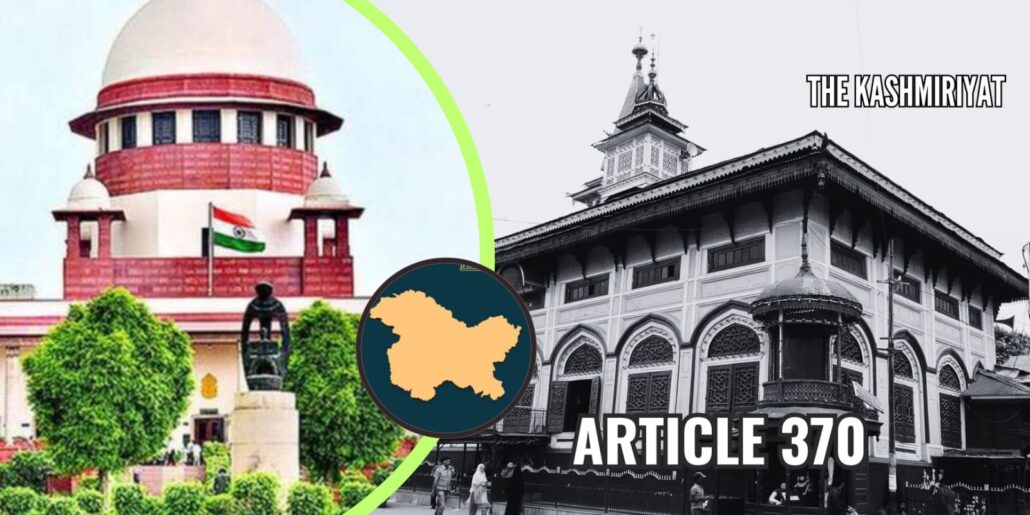
A five-bench judge of the Supreme Court of India is set to hear the bunch of petitions challenging the abrogation of Article 370 for the eight day today.
ALSO READ: ‘Who set up your client’: CJI dismisses PIL seeking validity of Article 370 abrogation
Starting with senior Advocate Kapil Sibal and at least five others including Kashmiri lawyer Zafar Shah have presented their arguments so far on the behalf of several petitioners claiming that Union government’s decision to do away with article 370 was “unconstitutional and illegal.”
Pertinently, a five judge constitutional bench of the supreme court led by DY Chandrachud, the Chief Justice of India, started hearing around 18 petitions on August 04.
Advocate Dave on Thursday argued that Article 370 had ‘achieved its life’ and could therefore not be abrogated after the dissolution of the Constituent Assembly in 1957.
Earlier the chief Justice remarked that the questioning during the debate does not intend that they are disagreeing with the counsel, however, the bench is also trying to understand the situation through the medium of discussion.
The Chief Justice of India on Thursday also said that the petitioners are expected to close their arguments by afternoon and post lunch the defenders (government) would begin the defending the decision of August 5, 2019 when the Articles 370 and 35a, that granted special status to Jammu Kashmir were abrogated.
Former Chief Ministers of Jammu Kashmir, Farooq Abdullah, Ghulam Nabi Azad, Omar Abdullah and Mehbooba Mufti have expressed “satisfaction” over the pleading of the case by the petition lawyers. “Jammu Kashmir is looking towards the Supreme court with great hope,” Mehbooba Mufti said.
The Central Government had filed a fresh affidavit in the court mentioning that situation post abrogation had changed in the region, however, the fresh affidavit was disregarded by the court stating that the court was hearing a “constitutional” matter.
Central Government has told the court to not fiddle with abrogation decision is it may harm the national interest.
Live updates
1030 A.M: Advocate Dwivedi begins argument:
Kashmir did not lose its internal sovereignty just because it acceded. Neither inclusion in Art 1 or the schedule could result in loss of internal sovereignty.
11: 00 AM: “India has promised to the people of Jammu Kashmir. Again, the Government of India have committed to people of Jammu Kashmir to give them an opportunity to decide. We have also agreed that the will of the people through the constituent assembly will determine the constitution of the state as well as the swear of union jurisdiction over the state,” states Advocate Dwivedi.
12:07 PM: Sr Adv CU Singh commences his arguments.
Article 356 was the provision used by the Government to abrogate the Article 370. The provision is to restore democracy not to abrogate it.
1210 P.M: The Reorganisation Act has been enacted in purported exercise of Article 3 of the Constitution of India. The question, therefore, is whether Article 3 of the Constitution authorises the union legislature to pass a law altering the constitutional status of a state, and reducing or degrading it to a union territory (or more than one union territory), argues Advocate Singh.
Article 3 – as it applied to the state of Jammu Kashmir – required not just consultation with, but the consent of, the legislative assembly of Jammu Kashmir. The proviso mandating consent was purported to be suspended by a Presidential Proclamation dated December 19, 2018, which also imposed Article 356 upon the state, It is then submitted in section (III) that Article 3 does not, either explicitly or by necessary implication, grant the union legislature the power to degrade or reduce a state into a union territory, argues Advocate Singh.
12: 10 P.M: Singh: Part I has to be read conjointly and when you read it conjointly no power is provided under Art 3 to convert a state into a UT notwithstanding the two explanations.
The reorganization act apart from 370 is very very important for the people of J&K. If this interpretation of Art 3 is upheld, then it is the thin end of the wedge for democracy and federalism and the country as a whole.
Singh: Because then any party in power at the centre, which also happens to be a party in power in a state, can just convert the state by a simple majority in state legislature and simple majority in parliament.
CJI: Is the conversion of state to UT severable from abrogation of Article 370 itself?
Advocate Singh: Yes, The two are completely different. Here what has happened is that they are relying on Article 3 by passing a simple law under state reorganization act.
CJI: Your argument on conversion of Jammu Kashmir into two union territories would survive irrespective of the decision of abrogation of Article 370?
Adv Singh: Yes, My written submission starts with that.
CJI: So your argument is that the conversion under the said order is unconstitutional in any state?
Advocate Singh: Yes, that is right. I will take you through the constitution and the various orders.




